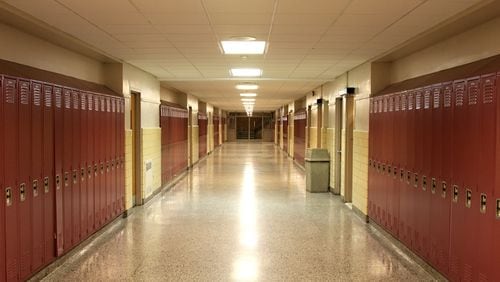Here is a thoughtful piece by a DeKalb teacher on why she believes the Opportunity School District is a mistake.
Cross Keys High School teacher Rebekah Morris says the unrelenting pressure in "failing" schools to document improvement efforts creates an environment where teaching and learning are diminished. The OSD will only worsen that pressure, she says, and lead to less creative schools where teaching becomes scripted and lifeless.
Along with teaching, Morris works with Thrive Youth Development, Inc., a nonprofit that seeks to transform communities in Metro Atlanta by teaching leadership and life skills to middle school and high school students. She also sits on the advisory board for Presencia, Inc., a nonprofit on Buford Highway providing economic, educational and social support to refugees and immigrants through after-school programs, job creation, and leadership development. This piece originally appeared on her Georgian Educator blog. (This version has been edited a bit.)
By Rebekah Morris
I am one of those strange teachers that didn’t immediately balk at the idea of the Opportunity School District. I’ve been to schools where the school building is failing structurally, the academics are languishing miserably, and the community is disenfranchised in every way. I’ve thought, “There is no way that having the government take over a place like this could be any worse for a kid.”
You all probably know the kinds of schools I’m talking about. The schools that would be taken over by the government would be the lowest schools. Under this proposed amendment, the newly created Opportunity School District, headed by an independent superintendent, answerable only to the governor, would be able to take over the lowest 20 schools in any given year (for a period of at least 5 but no more than 10 years). The OSD would never comprise more than 100 schools at any given time.
I can imagine there are at least 100 school communities suffering under the current educational atmosphere. I just happen to think there are better ways to address their problems.
Does State Takeover Equal Good Teaching?
The targeted school communities on the “list” of schools eligible to be taken over are schools where the majority of their students are in poverty. Poverty, as we all know, wreaks unimaginable havoc on a student’s life and on a school community. Taking the school by force will not immediately change the socioeconomic situation of the school’s community.
However, I also recognize that good teaching can make all the difference in a child’s academic performance. Give a good teacher to students living in poverty, and studies show those students will improve, compared to similar students who get stuck with a bad teacher. Of all the tools that reformers have at their disposal, teaching has the single greatest impact on student achievement.
So how can we get good teaching to occur?
For the sake of argument, let’s pretend the reason the students in these targeted schools are “failing” is because they have bad teachers and administrators. Proponents of the OSD believe removing the assumed “bad” teachers and administrators from a low-performing school will improve student performance, but this isn’t addressing some key issues.
One of those issues is teacher retention, both at low-income schools and in the teaching profession as a whole. The architects of the OSD assume they will be able to magically attract the “right” teachers to teach in some of the places with the worst reputations (whether rightfully or wrongfully gained). How do they plan to do this? Yes, schools like KIPP attract some of the best and the brightest. However, there are no guarantees schools within the OSD will have successful, nonprofit charter school management.
Invest in Holistic Education
And, for the sake of argument, let’s pretend there is good teaching happening at these schools. Many of the issues interfering with student success include the social, physical, mental, and psychological problems endemic to poverty. Now schools are underfunded in the areas of social workers, psychologists, nurses, music and art programs, after-school programs – and the list goes on. Instead of changing the management at these schools, perhaps what needs to happen is a major revamping of the current QBE funding formula for schools (one that involves more money spent in the classroom and less on overhead bureaucracy).
Schools that are successful with students living in poverty have these “wrap-around services” that address the whole child. Instead of changing the school personnel, give us the right personnel and the right amount of money to hire these key individuals.
At schools that become a part of the OSD, up to 3% of their allotted budget can be used to "cover administrative costs" for the OSD. These dollars (and other QBE dollars) should be spent on increased teacher salaries for teachers who teach in these "failing" schools. These dollars should be spent on improved, ongoing teacher training programs (like ones mentioned in "Building a Better Teacher" by Elizabeth Green or "The Teaching Gap" and "The Learning Gap" by James W. Stigler and James Hiebert). These dollars should be spent on books for every classroom, nurses for every school, adequate technology for every building, decent facilities for every community, and sufficient social services for every struggling student.
The lack of the above-mentioned items is why many schools are failing. The schools marked as “failing” are, in many ways, indicators of where we as a society have failed our schools. We spend millions of public dollars on sports stadiums, economic tax breaks for corporations, and bloated bureaucratic nonsense.
We need to spend our public dollars in a way that invests in our communities – especially the communities where parents lack the means to buy computers for their students, or pay for their children to see therapists, or donate huge sums for a new gymnasium. If you’re thinking these lower-income schools get additional funds from the federal government under Title I, please know the funds cannot cover all of these important areas. Not even close. (And I’ve taught at Title 1 schools for six years.)
OSD Encourages Innovation? Not Exactly.
The last point I want to explore is the claim that the very threat of the OSD provides political cover for superintendents to accomplish innovative ideas within their school districts. As a teacher who loves to work hard to get kids to succeed, I am not normally one to complain about doing a little extra work. However, I have to say the threat of the OSD taking over my school has been almost unbearable for many teachers – myself included.
Because our school is on the potential OSD “list,” we have had an enormous amount of work piled onto us to satisfy our current district and ultimately the state to show we are “doing enough” to address our low graduation rate and “failure” status. Many of the mandates have been positive for our school (i.e. collaborative planning, professional reading, writing lesson plans). On the other hand, many have been stifling – for both teachers and administrators.
When your school is “on the list,” it’s not enough if teachers are collaborating to develop rigorous lessons and tests. We have to document we are doing so by filling out a two-page form every week. It’s not enough to write a lesson plan. We have to write a 10-15 page lesson plan every week detailing every way we are teaching every single standard for every single day. It’s not enough we are trying to differentiate for every single student. We have to document we are doing differentiation for every single student. This includes one to two pages per student documenting student weaknesses, strengths, parent contact logs, deficiency notices, response-to-intervention sheets, data team documentation, etc, etc. (I’m sure I’ve forgotten some, too.)
And then you have to call all the parents, grade all the papers, create the innovative lesson plans, and support or sponsor student clubs and athletics.
And maybe raise your own children. Or sleep. Or eat.
Many teachers – myself included – have been doing these things all along, but because we are “on the list,” we have the additional burden of having to explain and show every single way we are doing every single thing. Administrators feel this pressure, the district feels this pressure, and the teachers feel this pressure.
Because of this, morale is generally low in schools targeted for takeover. There is little energy to try to “think outside the box,” or take on additional programs or activities. There is also little incentive from the state or the district – unless it’s quantifiable on a form. For many new teachers, the stress is overwhelming.
The students are the ones who really lose because their classes aren’t as innovative, creative, or exploratory as they could be. If your students aren’t performing well or aren’t graduating, perhaps they need — more than ever — for school to be engaging and rigorous. Think of schools like Paideia, the Avondale Museum School, Wesleyan School, Woodward Academy, or any school with project-based learning models or rigorous STEM programs. Teachers and students are dying to get into these kinds of schools. Not ones overflowing with documentation and paperwork.
So when I think about the OSD passing, I cringe. I can’t imagine years of this. I can’t imagine hordes of talented teachers choosing to teach at schools that are under such scrutiny, that limit their ability to teach creatively. I fear the OSD will only create more schools that will continue to hemorrhage talented teachers and students who will wish to escape the culture of test prep and paperwork.
As you think through the various arguments in support of the Opportunity School District, I hope you consider all sides of the argument. I don’t think proponents of the OSD are trying to harm public education. I’m just not sure they have thought through all the alternatives and all the ramifications.
I recommend you vote “NO” on Amendment 1 (which favors the OSD).







